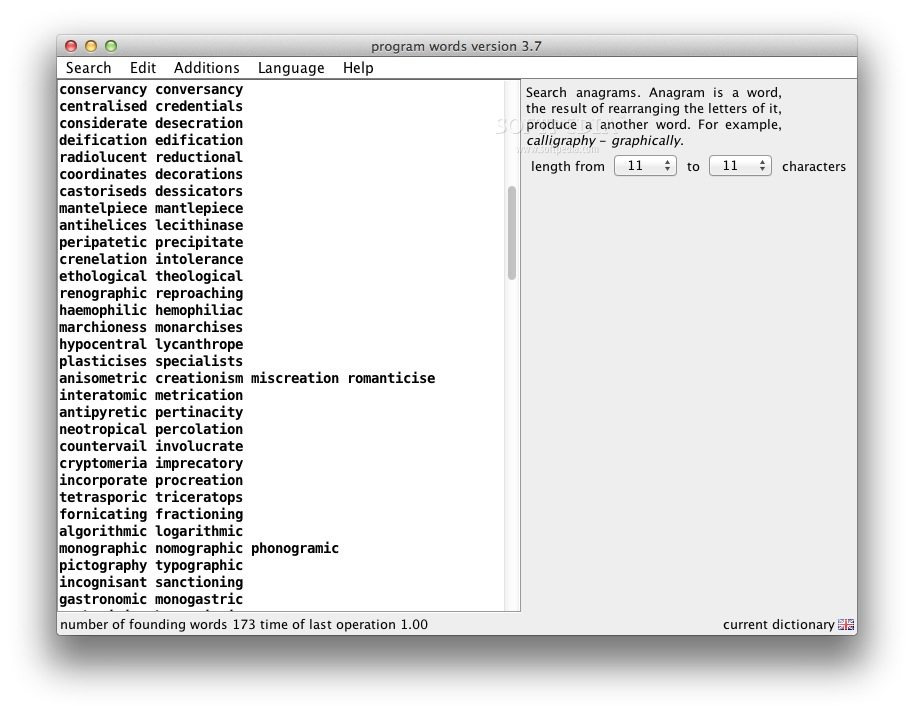It is an online, free program allowing users to extract text from PDF and images, also supports converting PDF to Word, Excel, Text formats. Upload PDF files into the online program. Choose the language of your uploaded PDF file. To quickly find any text string within any text file, try this from a terminal window: grep -l [text to find] [files to look in] For example, grep -l 123abc *.html will list the name of any file in the current directory that ends in.html and contains the string 123abc. (That's a lower-case-L following the GREP) Quite powerful, and fairly fast.
Microsoft Word includes a search function that makes it easy to search for all kinds of elements in a document, including text. Use the basic tool to look for instances of a specific word, or the advanced options to do things like replace all instances of a word with another one or search for equations.
Instructions in this article apply to Word 2019, 2016, 2013, 2010; Word for Office 365, and Word Online.
Perform a Basic Word Search
Go to the Home tab and select Find. Or, press Ctrl+F.
In older versions of Microsft Word, select File > File Search.
In the Navigation pane, enter the text you want to search for. A list of matching words displays in the Navigation pane and instances of the word are highlighted in the main document.
There are three ways to cycle through the results in the Navigation pane:
- Press Enter to move to the next result.
- Select a result with the mouse.
- Select the Up and Down arrows to move to the previous or next result.
Make any changes or edits to the document as needed.
Select the Down arrow to move to the next instance of the word.
Match Case, Whole Words Only, and More
Beyond searching for every instance of a word, you can get more specific about what you want to find. For example, you may only want whole instances of a word and not every word that contains the letter combination. Or, you may only want to find instances of a word that aren't capitalized.
Here's how to do an advanced search:
Select Home > Find to open the Navigation pane.
In the Navigation pane, to the right of the Search box, select the Search for more things dropdown arrow.
Choose Options.
In the Find Options dialog box, choose the description that best fits what you're trying to find. For example, to find instances of a word with the same capitalization, select Match case.
Use Advanced Find
Many of the choices available in the Find Options dialog box are also available in Advanced Find. Advanced Find includes the option to replace the text with something new. Based on your selection, Word replaces one instance or all instances at once. You can also replace the formatting, or change the language, paragraph, and tab settings.
Find Instances of Other Elements
Some of the other options in the Navigation pane include searching for equations, tables, graphics, footnotes, endnotes, and comments.
I'm trying to find a way to scan my entire Linux system for all files containing a specific string of text. Just to clarify, I'm looking for text within the file, not in the file name.
When I was looking up how to do this, I came across this solution twice:
However, it doesn't work. It seems to display every single file in the system.
Is this close to the proper way to do it? If not, how should I? This ability to find text strings in files would be extraordinarily useful for some programming projects I'm doing.
Peter MortensenWe're looking for long answers that provide some explanation and context. Don't just give a one-line answer; explain why your answer is right, ideally with citations. Answers that don't include explanations may be removed.
42 Answers
Do the following:
-ror-Ris recursive,-nis line number, and-wstands for match the whole word.-l(lower-case L) can be added to just give the file name of matching files.
Along with these, --exclude, --include, --exclude-dir flags could be used for efficient searching:
This will only search through those files which have .c or .h extensions:
This will exclude searching all the files ending with .o extension:
For directories it's possible to exclude a particular directory(ies) through
--exclude-dirparameter. For example, this will exclude the dirs dir1/, dir2/ and all of them matching *.dst/:
This works very well for me, to achieve almost the same purpose like yours.
For more options check man grep.
You can use grep -ilR:
istands for ignore case (optional in your case).Rstands for recursive.lstands for 'show the file name, not the result itself'./stands for starting at the root of your machine.
You can use ack. It is like grep for source code. You can scan your entire file system with it.
Just do:
In your root directory.

You can also use regular expressions, specify the filetype, etc.
UPDATE
I just discovered The Silver Searcher, which is like ack but 3-5x faster than it and even ignores patterns from a .gitignore file.
You can use:
The r stands for recursive and so will search in the path specified and also its sub-directories. This will tell you the file name as well as print out the line in the file where the string appears.
Or a command similar to the one you are trying (example: ) for searching in all javascript files (*.js):
This will print the lines in the files where the text appears, but it does not print the file name.
In addition to this command, we can write this too:grep -rn 'String to search' /path/to/directory/or/file-r: recursive searchn: line number will be shown for matches
learner_19learner_19List of file names containing a given text
First of all, I believe you have used -H instead of -l. Also you can try adding the text inside quotes followed by {} .
Example
Let's say you are searching for files containing specific text 'Apache License' inside your directory. It will display results somewhat similar to below (output will be different based on your directory content).
Remove case sensitiveness
Even if you are not use about the case like 'text' vs 'TEXT', you can use the -i switch to ignore case. You can read further details here.
Hope this helps you.
grep (GNU or BSD)
You can use grep tool to search recursively the current folder, like:
Note: -r - Recursively search subdirectories.
You can also use globbing syntax to search within specific files such as:

Note: By using globbing option (**), it scans all the files recursively with specific extension or pattern. To enable this syntax, run: shopt -s globstar. You may also use **/*.* for all files (excluding hidden and without extension) or any other pattern.
If you've the error that your argument is too long, consider narrowing down your search, or use find syntax instead such as:
Alternatively use ripgrep.
ripgrep
If you're working on larger projects or big files, you should use ripgrep instead, like:
Checkout the docs, installation steps or source code on the GitHub project page.
It's much quicker than any other tool like GNU/BSDgrep, ucg, ag, sift, ack, pt or similar, since it is built on top of Rust's regex engine which uses finite automata, SIMD and aggressive literal optimizations to make searching very fast.
It supports ignore patterns specified in .gitignore files, so a single file path can be matched against multiple glob patterns simultaneously.
You can use the common parameters such as:
-i- Insensitive searching.-I- Ignore the binary files.-w- Search for the whole words (in opposite of partial word matching).-n- Show the line of your match.-C/--context(e.g.-C5) - Increases context, so you see the surrounding code .--color=auto- Mark up the matching text.-H- Displays filename where the text is found.-c- Displays count of matching lines. Can be combined with-H.
If your grep doesn't support recursive search, you can combine find with xargs:
I find this easier to remember than the format for find -exec.
This will output the filename and the content of the matched line, e.g.
Optional flags you may want to add to grep:
-i- case insensitive search-l- only output the filename where the match was found-h- only output the line which matched (not the filename)
i: Ignore case distinctions in both the PATTERN and the input files.n: Prefix each line of output with the 1-based line number within its input file.s: Suppress error messages about nonexistent or unreadable files.r: Read all files under each directory, recursively.
How do I find all files containing specific text on Linux? (...)
I came across this solution twice:
find / -type f -exec grep -H 'text-to-find-here' {} ;
If using find like in your example, better add -s (--no-messages) to grep, and 2>/dev/null at the end of the command to avoid lots of Permission denied messages issued by grep and find:
find is the standard tool for searching files - combined with grep when looking for specific text - on Unix-like platforms. The find command is often combined with xargs, by the way.
Faster and easier tools exist for the same purpose - see below. Better try them, provided they're available on your platform, of course:
Faster and easier alternatives
RipGrep - fastest search tool around:
The Silver Searcher:
ack:
Note: You can add 2>/dev/null to these commands as well, to hide many error messages.
Warning: unless you really can't avoid it, don't search from '/' (the root directory) to avoid a long and inefficient search! So in the examples above, you'd better replace '/' by a sub-directory name, e.g. '/home' depending where you actually want to search...
BludzeeBludzeeThere's a new utility called The Silversearcher
It works closely with Git and other VCS. So you won't get anything in a .git or another directory.
You can simply use
And it will do the task for you!
Use pwd to search from any directory you are in, recursing downward
UpdateDepending on the version of grep you are using, you can omit pwd. On newer versions . seems to be the default case for grep if no directory is giventhus:
grep -rnw -e 'pattern'
or
grep -rnw 'pattern'
will do the same thing as above!
mahatmanichmahatmanichgrep can be used even if we're not looking for a string.
Simply running,
will print out the path to all text files, i.e. those containing only printable characters.
Peter MortensenHere are the several list of commands that can be used to search file.
Atul ArvindAtul ArvindExplanation from comments
find is a command that lets you find files and other objects like directories and links in subdirectories of a given path. If you don't specify a mask that filesnames should meet, it enumerates all directory objects.
Try:
which will search all file systems, because / is the root folder.
For home folder use:
For current folder use:
kenorbHope this is of assistance...
Expanding the grep a bit to give more information in the output, for example, to get the line number in the file where the text is can be done as follows:
And if you have an idea what the file type is you can narrow your search down by specifying file type extensions to search for, in this case .pas OR .dfm files:
Short explanation of the options:
.in thefindspecifies from the current directory.-name'*.*' : for all files( -name '*.pas' -o -name '*.dfm' ) : Only the*.pasOR*.dfmfiles, OR specified with-o-type fspecifies that you are looking for files-print0and--nullon the other side of the|(pipe) are the crucial ones, passing the filename from thefindto thegrepembedded in thexargs, allowing for the passing of filenames WITH spaces in the filenames, allowing grep to treat the path and filename as one string, and not break it up on each space.

Silver Searcher is a terrific tool, but ripgrep may be even better.
It works on Linux, Mac and Windows, and was written up on Hacker News a couple of months ago (this has a link to Andrew Gallant's Blog which has a GitHub link):
Peter MortensenA Simple find can work handy. alias it in your ~/.bashrc file:
Start a new terminal and issue:
Peter MortensenI wrote a Python script which does something similar. This is how one should use this script.
The first argument, path, is the directory in which we will search recursively. The second argument, pattern_to_search, is a regular expression which we want to search in a file. We use the regular expression format defined in the Pythonre library. In this script, the . also matches newline.
The third argument, file_pattern, is optional. This is another regular expression which works on a filename. Only those files which matches this regular expression will be considered.
For example, if I want to search Python files with the extension py containing Pool( followed by word Adaptor, I do the following,
And voila, it generates the path of matched files and line number at which the match was found. If more than one match was found, then each line number will be appended to the filename.
Peter MortensenOnline Dictionary
DilawarDilawarUse:
This will report how many copies of your pattern are there in each of the files in the current directory.
Peter Mortensengrep is your good friend to achieve this.
if you don't care about the case of the text to find then use
To search for the string and output just that line with the search string:
e.g.:
To display filename containing the search string:
e.g.:
There is an ack tool that would do exactly what you are looking for.
You may ignore -i for case sensitive search
All previous answers suggest grep and find. But there is another way: Use Midnight Commander
It is a free utility (30 years old, proven by time) which is visual without being GUI. It has tons of functions, and finding files is just one of them.
Peter MortensenThe below command will work fine for this approach:
Peter MortensenHow To Search For Words In Word Document
Avoid the hassle and install ack-grep. It eliminates a lot of permission and quotation issues.
Then go to the directory you want to search and run the command below
I am fascinated by how simple grep makes it with 'rl'
Use '-r' without 'l' to see the file names followed by text in which the pattern is found!
Works just perfect..
Hope it helps!
nitinr708nitinr708